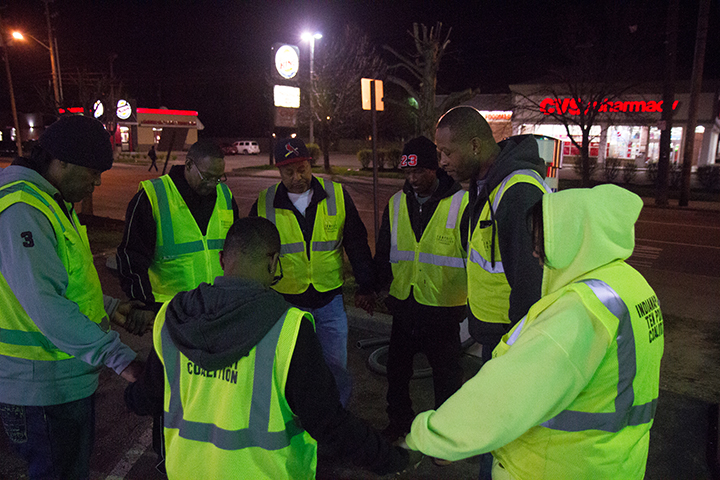Commentary by Brad Thompson
At just about 10 p.m. on a Saturday night, as they were walking the streets, members of the Ten Point Coalition got a tip there was an armed robbery underway at the Family Dollar store about a block away. The coalition members approached cautiously, stayed about a hundred yards away. The team leader called police. A few minutes later, after the robbery ended, the police arrived.
The Ten Point Coalition members are not private police. That’s not their job. The coalition is about crime prevention, not detection. When crime occurs, they consider it a failure and take it personally. Their goal is to reduce violent crime in the neighborhoods they serve, and they carefully track the numbers in those neighborhoods.
Coalition members try to prevent crime by forming relationships with people in the neighborhood, identifying those in need and suffering, and reaching out to help, in the name of the Lord.

Sometimes they help by being a sympathetic ear to listen to those who are struggling. Other times they might respond to an argument in progress and work to mediate the dispute before it escalates, especially when gangs are involved. Other times they talk with parents about how to best look after children. They try to get help for people struggling with addiction, and they mentor youth in the area. Primarily,they reduce crime by showing people in the neighborhood that they are loved.
But the coalition supplements that emotional support with more tangible assistance. When asked what the biggest need is among people in the neighborhood, Rev. Charles Harrison, the group’s leader, is very clear: jobs. Jobs not only provide financial wherewithal, they provide self-worth. Jobs also fill people’s time. So as they walk dark streets talking to people, the coalition members are on the lookout for youth who want to work. Wallace Nash, a team leader for the Ten Point Coalition, carries a stack of job listings that he hands out to young people looking for work.
The members of the Ten Point Coalition come from the streets they walk. It’s a very deliberate strategy to find people who have credibility in the neighborhood. Because the coalition members walk for several hours, four nights a week, 52 weeks a year, they get paid a modest stipend. The money for the program comes from fundraising through churches and also some government grants, although those government grants seem to be dwindling.
A week after the armed robbery, Nash is standing in front of the Zionsville United Methodist Church congregation, trying to explain how he got involved in the Ten Point Coalition. In 2015, Nash explains, two 17-year-olds were fighting over a gun in his front yard in the Butler Tarkington area, and one of the young men took the other’s life. He could not ignore the violence.
ZUMC wants to walk alongside the members of the Ten Point Coalition. Not literally, not in the sense of walking the streets, because that truly requires people who live in the neighborhoods, but in the sense of supporting the mission. So the church does what it can to raise money for the cause, taking up a special collection during Lent which it presented to Nash, totalling more than $32,500. The church is also looking for other ways to support the coalition, including providing food at the beginning of the evening walks.
But there is another way for people in Zionsville to help. Nash needs leads on jobs. He needs to find work for those who are able and willing but who may lack the education or experience required for many jobs. He has important relationships with organizations like Federal Express, which sends a bus into the neighborhoods to pick up people for warehouse jobs. Many of the youth are anxious to learn, and so employers who offer job training for manufacturing jobs are highly coveted. Nash has been working tirelessly to encourage more career days in IPS schools so that the youth can learn about the range of jobs available, but he encounters resistance to such efforts. Some of the older youth have criminal records, and he is therefore particularly interested in companies that are willing to give prior offenders a second chance.
The Ten Point Coalition does what it can to address the decline in the family structure in the neighborhoods. Nash laments that in the old days, many homes were simply absent a father, but now they are often absent a mother as well because of drug abuse. Coalition members are working hard with people in the neighborhood to encourage responsible living. But in the absence of jobs, they are swimming against a very strong current. In many ways, the lack of employment is the root of all evil. Nash, a 56-year-old retired school bus driver, loves these kids and works every day to help them find a path forward.
Those who wish to help can contact the coalition at [email protected].



